Seattle Writing Prompts: The thirteenth floor
Seattle Writing Prompts are intended to spark ideas for your writing, based on locations and stories of Seattle. Write something inspired by a prompt? Send it to us! We're looking to publish writing sparked by prompts.
Also, how are we doing? Are writing prompts useful to you? Could we be doing better? Reach out if you have ideas or feedback. We'd love to hear.
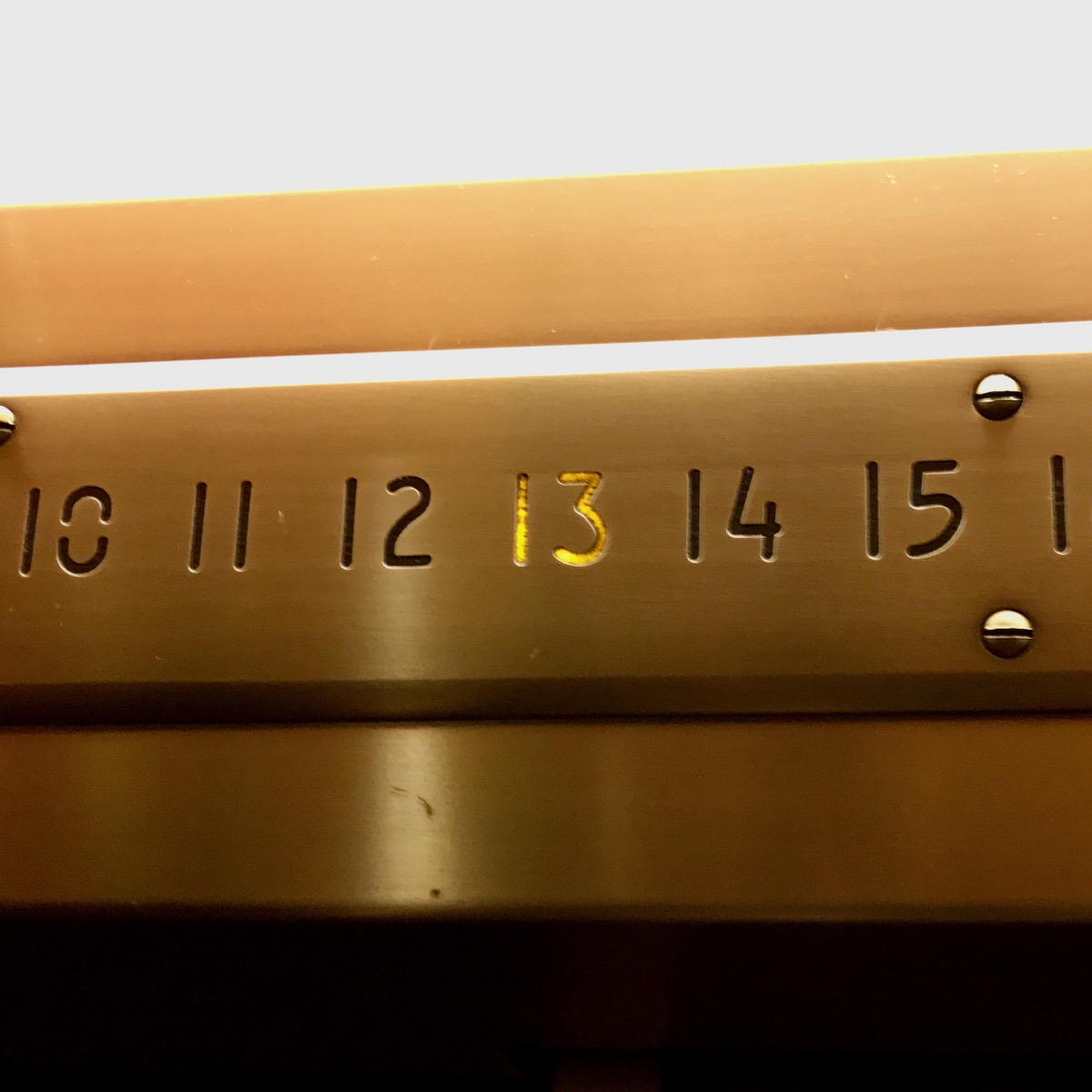
Superstition, ugh. Am I right? The public thinks something bad is going to happen on the thirteenth floor. So, what would be the thirteenth becomes the fourteenth floor, and suddenly your building has thirty instead of twenty-nine stories. Somehow, because that floor has changed its title (or has it?) it is magically cleared of bad luck.
Sorry triskaidekaphiliacs, or people who are obsessed with the number thirteen, but there aren't many buildings with a thirteenth floor. I happen to work in one, and it was an almost shocking site to see the elevator hit that number without skipping it on my ride up. Now I relish it, and occasionally, when I ride the elevator with someone disembarking on the thirteenth floor, I'm curious as to what they'll find on it.
According to some accounts, as many as 85% of the buildings with an Otis elevator did not have a thirteenth floor. Unless they are versed in this oddity of modern social architecture, most people seem to not notice the thirteenth floor thing. So, if you imagine that floor is a Roky Ericcson song sending you a message, I'm sorry to say that floor would be wrong.
This seems like it would be useful Wikipedia page — "Buildings in Seattle that have a thirteenth floor." So, if you live or work in one, drop us a line, and if we get enough, maybe we can create it.
But until we have an exhaustive list, all we have is potential stories in mostly imaginary buildings — things that might have happened on the thirteenth floor, if somehow they existed but we never learned that they are all cursed by their very numbering.
Today's prompts
Everything was on the upswing. New offices. Name being painted on the door by building maintenance guy, kneeling in blue coveralls, applying the gold to my name: "Chuck Masters, Private Investigations". New secretary, and she's a real sweetheart. Last month's billing through the roof. Ten cases closed. Things keep going like this, I'm gonna bring in a junior partner and see if we can't take a swipe at Pinkerton. Maintenance guy finished, and stood, stretching his arms, different parts of him cracking. "Well," he said. "Glad things are going so good for ya. I guess I'll be seeing you in a few months." — "Why so, pal?" — "You're the fifth dick to move into this place in two years. Ain't none of you lasted more than six months or so. And I'll tell you why, fella." — "Okay. Let it loose." — "I will. It's because you're dumb enough to rent an office on the thirteenth floor. Might as well call yourself Bad Luck Masters, because that's what you're in for, buddy. Mark my words."
She would never be able to afford to rent in this building on her salary. A skyscraper in Belltown? No way. But the rent on the units on the thirteenth floor was $1000 a month cheaper than the rest, and for some reason, the landlord seemed desperate to rent them. Her only problem would be furnishing the place. And her air mattress popped the first night out of the blue, so she doesn't have a bed. And the electricity cut out for a while. And her shower went ice cold randomly. And she smelled a weird electrical smell in the kitchen. And when she turned out the lights, she could have swore there was a face looking in her window.
Of course the elevator stopped with him inside. Somewhere around the 14th floor. He rang the call button, and maintenance said somebody would be right up to help him. Then he opened his phone and got onto Slack. "Hey, I'm stuck on the elevator." Somebody responded with the "face screaming in fear" emoji. "lol, it's fine" he typed, just as the elevator dropped a floor or so, then bounced and stopped, the friction from the brake pads filling the small room with a burning rubber smell. The lights flickered. Then the door opened, and he stepped out. Immediately, he was tackled, and his arms were cuffed behind him. "We've got a security breach on thirteen," said a man's voice, and the squelch of a radio. "Roger" came the reply. But wait — this building didn't have a thirteenth floor. Or did it?
"We can get there on the stairs," he said. It was "take your kids to work" day, and they were the only two ten-year-olds. Both his dad and her mom were in a boring meeting. They were given iPads and told to entertain themselves, but he was fascinated that this building had a thirteenth floor. They had tried the elevator, but that floor wouldn't light up when they pushed the button. So they tried the stairs. The first staircase exit on thirteen was locked. But she suggested they try the second, and, sure enough, that one was ajar. They opened it, creaking on the hinges, and were greeted by a weird smell. "Mothballs", she said. He brought out his iPhone and turned on the flashlight, and they stepped into the floor.
"It used to be easier," George said. "Back before the superstitions." — "yeah, but isn't that kind of our fault?" asked Bernie. "I mean, before us, people came up to thirteen all the time. Lived here. Worked here." — "Like us, for example." — "Exactly. Like us. And then, what, a couple of accidental deaths and suddenly people stay away like the plague." — "Well, except the maintenance guy. He still comes up here every week." — "He doesn't like it, though. You can see he wants to be done right quick." — "Maybe that's your fault, Bernie. Maybe if you didn't rattle your chains whenever he showed up." — "Don't you blame me, George. Being stuck with you here for the rest of time isn't enough for me." — "I'm just saying that if you laid off, maybe he would encourage people to move in and then we'd really have somebody to haunt." — "Don't you go blaming me, now. You're the one who got us killed in an old building." — "Wait, you hear that? He's here. Just lay off this once, okay?" — "What if I only moan in his ear?" — "Fine. Whatever. Do whatever you need."
Book News Roundup: It's all bad news, kids
Regarding yesterday's news that Amazon is looking to build an "equal" headquarters in some other North American city than Seattle: I was a bookseller for twelve years, first at a chain that Amazon destroyed and then at an independent bookseller. I have learned through painful experience never to trust Amazon. Yes, it's probably true that Amazon will soon be too big for Seattle alone. But if you think Amazon isn't going to use this opportunity to pit one "headquarters" city against another in a race to the bottom, you're mistaken. They will gladly take Seattle's future hostage in exchange for a shiny new tax cut. I have learned from experience that Amazon will do whatever it takes to come out on top.
Speaking of chain bookstores, there's no good news coming out of Barnes & Noble these days — particularly in the ebooks division:
Total company [first quarter] revenues fell 6.6% to $853 million, while Nook revenues fell 28.1%, to $29.5 million. That is literally the lowest Nook revenues ever recorded.
So that book written by Hillary Clinton's pastor has just been pulled from shelves due to rampant plagiarism.
Big changes at Vanity Fair, as editor Graydon Carter is retiring. Here is where I'd ordinarily say this is a great opportunity for an enterprising young editor to make her mark and reimagine the glossy magazine for a new generation, but come on. We all know that's not going to happen. It's been sad watching Vanity Fair shrink to anemic sizes; that last Hollywood issue was a shadow of years past.
The Help Desk: Not your porn? Not your problem.
Do you need a book recommendation to send your worst cousin on her birthday? Is it okay to read erotica on public transit? Cienna Madrid can help. Send your Help Desk Questions to advice@seattlereviewofbooks.com.
Dear Cienna,
A few weeks ago at the library, I was passing by a bank of the library’s computers when I couldn’t help but notice one of the patrons was watching pornography. I mean, it was a hardcore, full-penetration video, and he had his back to the whole library! (No, he wasn’t touching himself.)
I don’t like to think of myself as a prude, but I was concerned for others passing by. It’s summer vacation, and kids hang out at the library! So I complained to a librarian.
The librarian told me that the computers had special privacy screens installed so that people could only see what was on them if they stood directly behind the user. She also said that they couldn’t interfere with the patron’s freedom of speech. So, basically, her hands were tied.
What do you think of this policy, Cienna? Should I have done something as a citizen? There were available computers facing the wall that he could have used.
Lorna, [Neighborhood withheld by request]
Dear Lorna,
You don't like to think of yourself as a prude, I don't like to think of myself as a mid-30s spinster whose idea of "intercourse" means demanding dessert for an appetizer on first dates at chain restaurants. But here we are.
Sure, he could have used a more discrete location. Then again, you could've refrained from standing directly behind him and staring at his privacy-screened computer long enough to catch the proverbial cumshot, curtsy and final curtain.
If you are with a young child in the library and they are in a position to stare at someone else's shielded computer screen long enough to catch an eyeful of hard-core porn, well, you should be watching your child better. If it's an older kid, they're spying because they're curious. These kids are begging for two lectures: one on sex and another on how rude it is to invade other people's privacy (even if it's in public).
But this issue isn't really about the lost innocence of children. Often, the people shamed for watching porn in Seattle libraries are homeless. So this debate becomes a coded discussion for restricting how homeless people are allowed to use a public space.
Here are my pre-diabetic spinster thoughts on that: Libraries are sacred because they contain more knowledge than any one person could ever consume and they share it for free. And in gold-plated cities like Seattle, where living on the streets ensures that you will face routine government-licensed harassment from police on top of the normal fears, stresses and dehumanizing interactions you endure during a routine day, libraries are rare sanctuaries. Libraries are knowledge, reprieve, warmth, free public toilets, and free internet, which can be used for job searches or anal fisting searches. Neither are your business, as it is not your job to censor other people's interests, hobbies, genre preferences, sexual preferences, or any other type of content housed in a library. Nor is this the job of librarians. So keep your eyes to yourself.
Kisses,
Cienna
Portrait Gallery: Kelly Link
Each week, Christine Larsen creates a portrait of a new author for us. Have any favorites you’d love to see immortalized? Let us know

Friday September 8th: Word Works: Kelly Link
Kelly Link is one of the most influential short story writers in the modern era. As both a writer and as an independent publisher, Link has established an aesthetic that manages to reimagine both literary fiction and fantasy. On Friday, she’ll give a craft talk titled “A Vampire is a Flexible Metaphor.”
Frye Art Museum, 704 Terry Ave., 322-7030, http://hugohouse.org. $15. All ages. 7 p.m.
Kissing Books: the sunrise of your enemy
New column! Every month, Olivia Waite pulls back the covers, revealing the very best in new and classic romance. We’re extending a hand to you. Won’t you take it?
This month’s books show that in Romancelandia, enemies and villains are not precisely the same thing.
An enemy is a useful cog in any genre’s story machine. Opposing goals spark conflict, lead to arguments and struggles, and the straightforward kind of who’s gonna win this drama that so many books and movies and reality shows thrive on. Romance has featured volatile enemies ever since Beatrice and Benedick first traded insults, or since Elizabeth Bennet first told Mr. Darcy he could take his proposal and shove it somewhere thoroughly ungenteel (I paraphrase).
Darcy and Benedick, though, are not our story villains. That role goes to Don John (I love the blank and bitter Keanu Reeves portrayal. Fight me) and Wickham, that charm-vomiting lech. Villains are also useful to the plot – but villains are static, unpleasant, morally repulsive. Unredeemable.
Enemies, though, can be turned into lovers.
There’s a whole romance subgenre for this, called, with laudable clarity, enemies-to-lovers. In other words there is a whole species of book that exists to turn someone you hate into someone you love. Outsider views of mainstream romance often imagine both hero and heroine as idealized archetypes – the too-oft-expressed fear that frumpy housewives will catch Unrealistic Expectations from all those fuschia Fabio hunks assumes that romance heroes are always kind, protective, and sexually generous. On the page, though, romance heroes/heroines are frequently assholes. They scorn. They undermine. They loathe with the fire of a thousand suns.
And then…they learn. They change. They begin to defend each other, in private first and then in public. An enemy might make a mistake, or follow a bad principle, or operate under a misunderstanding – but they will repent this, and eventually find some way to atone. Love and respect blossom in the unlikeliest of places. When done well it feels like a sunrise breaking over the horizon of the heart.
So here’s to the enemies, the nemeses, the soon-to-be-cherished foes. They show us that hatred can be set aside. That opposition and conflict are not the same thing as evil.
They give us hope for one another. It’s what romance does best.
Recent romances

Sidebar by Carsen Taite (Bold Strokes Books: contemporary f/f.)
There was so much to like about this book. Judge Camille Avery is new to the federal bench and looking to make an impression. Her new clerk West Fallon would rather be saving the world but couldn’t break a promise to her mentor to serve the court system for one year. The heroines sparkle both alone and when together – which makes it a complete mystery why the book spends so much time keeping them separated. They honestly spent more time avoiding each other than they did falling in love, which makes the big Grand Gesture at the end ring terribly hollow. That said, this is a stellar example of what romance readers call competence porn, where part of the pleasure is watching the protagonists actually perform their fancy, exciting, difficult jobs.
Other girls dreamed of being president someday, but in her dreams she’d been wearing a black robe and seated beside eight other justices at the highest court in the land. This was just the first step, and she was determined to tread carefully.
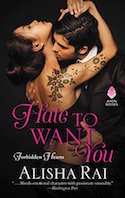
Hate to Want You by Alisha Rai (Avon Books: contemporary m/f)
Every so often an already strong author pulls out the stops and presents the world with a masterpiece. Jeannie Lin’s The Jade Temptress, for instance, or Earth Bound by Emma Barry and Genevieve Turner. And now Alisha Rai, because this is hands-down the best romance I’ve read all year. Sharp, sexy, funny, and achingly real, it’s the first in a trilogy of romances between two once-close, now-feuding families, the Kanes and the Chandlers, where the weight of secrets is almost Gothic. Everybody has something to hide; everybody has something to lose. Nicholas Chandler is an executive for the grocery chain his family used to co-own with the Kanes – before a fatal crash, a shady business deal, and a suspicious fire shattered the relationship. Nico is a dutiful son, a loving grandson, and a protective older brother 364 days out of the year. That last day belongs to Olivia Kane, his high school love whom he’s never gotten over. Now a successful tattoo artist moving from city to city, Livvy texts him one day a year for the furtive, desperate sex they can’t seem to stop having. But now Livvy’s back to care for her ailing mother, and with a town full of gossips watching, she and Nico will have to try to keep their distance and keep the walls up between their wounded hearts. You can guess how well that works. It’s glorious.
“You’re so damn stubborn, Livs.” “A stubborn marshmallow?” “All marshmallows are stubborn. Nothing that soft could hold its shape unless it was stubborn as hell.”
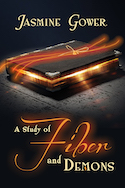
A Study of Fiber and Demons by Jasmine Gower (Less Than Three Press: fantasy m/m/f)
Academic infighting at a magical university: my absolute favorite thing in any genre. Fantasy romance often has more scope for moral flexibility, less shiningly heroic heroes, and this book takes full advantage of that liberty. Disgraced academic Alim is petty and bitter and more than a little shady – he’s also intelligent and ambitious and lonely, which together nicely temper his obvious faults. The romance is slow to start, but who cares when the bickering is so much fun? This is definitely one of the least optimistic romances I’ve read in some time – people are treacherous and self-serving, academia is corrupt at every level – but watching three uniquely terrible people come to care for each other and decide to be slightly less terrible is surprisingly satisfying. Plus squid-demons and an underwater city. It breaks my heart a little that the title and cover are not more representative of this book’s wit and charm.
“Now don’t be like that,” Alim said, but he didn’t push Liam’s hand away. “You’re my nemesis. What would people say?”
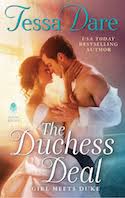
The Duchess Deal by Tessa Dare (historical m/f, Avon Books)
A Regency romp is like a glass of champagne: all sparkle and fizz. You can’t live on it, but the best ones make you wish that you could. This book strings a series of implausible events together with snappy dialogue and dazzling chemistry. There are anachronisms, but to trot them out for pedantry’s sake would be like criticizing the Marx Brothers for unrealistic set design. This is a Technicolor romance version of Beauty and the Beast and Cinderella smashed together, with a dash of Batman thrown in for shits and giggles. And there are giggles, thanks to Dare’s genius for delightful turns of phrase. The wit makes familiar character types seem new again: the misanthropic, wealthy ducal hero with a scarred face, the open-hearted seamstress heroine with a spine of steel, snarky butlers, plucky urchins. A feel-good, laugh-out-loud confection for when you’re harried and heartsore.
“Do not harbor any illusions that my scars transformed me into a jaded, ill-tempered wretch. I was always – and shall remain – a jaded, ill-tempered wretch.” “Were you always this long-winded, too?”
This Month’s Romance Believes Black Lives Have Always Mattered
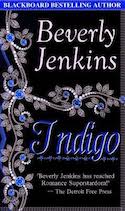
Indigo by Beverly Jenkins
To read a Beverly Jenkins historical is to see the veil drawn aside and a light shone down onto the past. The celebrated Queen of black American historical romance, she focuses on black heroes and heroines – most in the 19th century, though she also writes contemporaries – who are the architects of their destiny and staunch advocates for their race. Indigo is the story of Hester, a formerly enslaved heroine, and Galen, a wealthy black Creole hero, born free: both work for the Underground Railroad and fight against the shuddering cruelties of the chattel slavery system in 1856 Michigan. It’s common to say that historical romance’s appeal lies in its escapism – but it’s important to ask just who is escaping, and from what. Fantasies of vast aristocratic wealth and social power can exclude readers when those fantasies depend on the subjugation of entire groups of people, as shown in Tyrese L. Colman’s great recent essay on reading Jane Eyre while black. Beverly Jenkins is focused on a whole other kind of escape, both literally and figuratively. She offers readers visions of black community and shared purpose during a time when whitewashed historical narratives would have us believe all black folk lived in bondage, poverty, and fear. She gives respect, tenderness, and love to people who were too often met with violence, derision, and dehumanization. Her stories ring with rich details – Indigo is based on the true story of a free black man who sold himself back into slavery to be with the woman he loved; the book features a cameo by John Brown and shows characters supporting the Free Produce Movement. The question of whether slavery will end by law or by bloodshed looms large. All this plus heart-stopping adventure, swoony sex, and intrigue. Some classics grow rickety with the passage of time: this one only feels more and more vital as the weird time of 2017 weirds on.
Upcoming Conventions and Conferences
The second ever Historical Romance Retreat has a stellar lineup: Julia Quinn, Eloisa James, Elizabeth Essex, Jade Lee, and Delilah Marvelle, among others. Spokane’s Davenport Hotel is a uniquely charming venue and a perfect backdrop for expert historical garb – you’ve never seen anything quite like a ballroom full of historical romance fans dressed to the nines. In addition to author meet-and-greets and some truly tempting presentations (History of Medicinal Herbs! The Women of Pugilism! A tasting lecture on the history of port!), the schedule features a movie night, a Regency gambling night, a book fair, the Grand Ball, and an intriguing little calendar item called Absinthe and Abigails. The whole luxurious thing takes place September 27 - October 1.
Further out on the calendar
- The Emerald City Writers’ Conference: October 13 - 15
- Put Your Heart in a Book Conference: October 13 - 15
- Read With Pride Northwest: November 4 - 5
- JaneFest 2017: November 4
Daniel Handler's All the Dirty Parts is just as enticing, funny, profane, and frustrating as sex itself
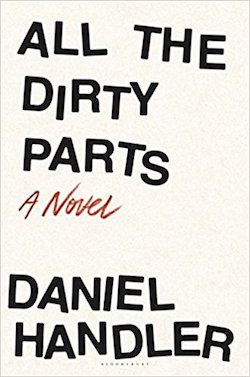
Daniel Handler appears in conversation with Sherman Alexie tonight at Temple De Hirsch Sinai. Here's the beginning of his new novel, All the Dirty Parts:
Let me put it this way: this is how much I think about sex. Draw a number line, with zero is, you never think about sex and ten, is it's all you think about, and while you are drawing the line, I am thinking about sex.
That should give you an idea of what Dirty is about: it's basically Portnoy's Complaint meets Muppet Babies. The high concept is that it's a teen sex comedy with everything removed except for — wait for it — all the dirty parts. Handler tells the story from the perspective of a sex-obsessed teenage boy named Cole. Cole sleeps around a lot, until he falls for the girl of his dreams — a woman who is just about as horny as he is.
Dirty is a return to form for Handler: his very first novel, The Basic Eight, was about precocious teenagers, and Dirty feels like it could takes place in the same universe. It's a kissing (and probably humping) cousin, with a huge family resemblance: like Basic, Dirty is funny and maddening and cute and boundlessly charming. Unfortunately, like Basic, Dirty feels like a good novel with something important scooped out, but I'll be damned if I can explain what that "something important" is.
Handler has my vote for the American Novelist with the Greatest Unfulfilled Potential. Aside from his Lemony Snicket books, he has never published a book that entirely worked for me — either the premise is too overpowering, or Handler lacks the follow-through to make the book a cohesive experience, or the book simply fails to leave a lasting impression. Unfortunately, Dirty demonstrates all three of these failings at the same time. It's slight — more a novella than a novel, really — and monotonous and it doesn't really build to much of anything.
We just spin around in Cole's brain for a while in Dirty, and we never really arrive anywhere. And before you go and blame the smutty nature of the book for its inconclusive nature, you should know that Nicholson Baker wrote not one but two erotic novels — Vox and The Fermata — that demonstrate true depth of character and significant change. Sex can be transformative (for good or ill,) but Cole doesn't seem to be willing or able to make that transformation. Because of that, Dirty never quite achieves the climax it seems to desperately want.
Thursday Comics Hangover: These bottoms are the tops
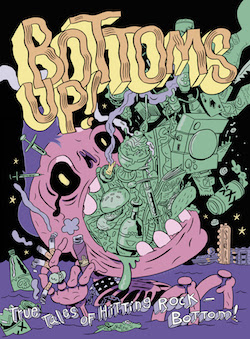
Next week, editor J.T. Yost will debut his new comics anthology, Bottoms Up! True Tales of Hitting Rock Bottom, at the SPX alternative comics festival. In his introduction, Yost identifies the book as a labor of love, an “attempt to humanize addiction through real stories told by actual addicts.” The book features a wide array of contemporary alternative comics talent, including Seattle cartoonists Tatiana Gill and Max Clotfelter.
Addiction stories can be formulaic, in part because audiences intimately understand every rise and fall of the narrative. If things are looking good for the characters in the story, astute readers know that the next decline is just around the corner. Yost’s decision to focus only on the worst possible moments is canny: all the buildup and false promises of traditional recovery narratives are trimmed away, leaving only the central pivot of the story.
The definition of “rock bottom” varies wildly from artist to artist. Some of the moments are funny (the protagonist of Clotfelter's story realizing that the woman he slept with has a full-back tattoo of the Confederate flag and the words “Dixie Bitch”) and others are horrifying (Matt Rota’s long story “That Summer, Way Back” involve a heartbreaking case of animal neglect.) Others, like Victor Kerlow’s “The Big Joke,” depict rock bottom as an abstract emotional state — the complete falling-apart of ego as depicted by a body slicing itself into meaty slivers in an almost-overdose.
Not all of these stories are autobiographical; many are anonymous tales told to the cartoonists, who then interpret the stories in their own styles. Daniel McCloskey depicts one man’s account of a near-suicide through the lens of Taylor Swift’s single “Shake It Off,” and the story blissfully skirts the line between bad taste and good comics. Adam Pasion’s adaptation of another anonymous storyteller’s descent into digital voyeurism somehow manages to portray the creepiness of the addiction while not feeding the reader’s prurient interests. Two of the stories involve imaginary pets. At least one involves regrettable hot tub sex.
Even if you’ve never woken up from a blackout haunted by a familiar gnawing fear in your gut, you’ll likely find a reflection of yourself somewhere in Bottoms Up! There’s no single thread through all of these stories except that most basic human failing: our frustrating ability to let ourselves down, despite our own best intentions. There’s something incredibly comforting about reading a whole book of failures — funny failures, sad failures, tragic failures — told by people who lived to tell the tale.
At last night's book club, we agreed to disagree
We had a nice big crowd at last night's Reading Through It book club. People seemed eager to discuss Naomi Klein's No Is Not Enough: Resisting Trump's Shock Politics and Winning the World We Need, though the response was relatively mixed. Many readers thought Klein did an admirable job of turning around a cogent book-length analysis of the fledgling Trump administration in a matter of months. At least one book club attendee, though, was thoroughly unhappy with what he perceived to be the shoddiness of Klein's work.
In fact, the book club's discussion of No Is Not Enough seemed to come from two diametrically opposed poles. Some folks thought that Democrats needed to encourage a slate of big, bold policies like free college and universal health care in order to win votes. Others thought that Democrats would have to be much more pragmatic to win. Some were uneasy with Klein's full-throated support of Bernie Sanders. Others argued that Sanders was the only template for future Democratic candidates.
Still others argued that Democratic embrace of nuance is the big problem — Republicans tell simple stories and offer simple solutions to the problems presented in those stories. Others claimed that picking apart Klein's book was getting us nowhere, and that focusing on solutions was the only way to go. Basically, nobody had the answers. But at least people could agree that they didn't have the answers.
My favorite insight from last night's book club was the idea that Democrats excel at creating movements, but they are not good at creating campaigns. The Occupy movement, for instance, successfully introduced income inequality into the popular conversation, but it failed to create a lasting impact in the Democratic party.
So the question remains: can Democrats take the energy of the anti-Trump movement and turn it into a campaign with lasting effects? That's the closing question of No Is Not Enough, and the answer is still not readily apparent.
The next Reading Through It Book Club meets at Third Place Books Seward Park on Wednesday, October 4th at 7 pm. Our next book, Noam Chomsky's Requiem for the American Dream: The 10 Principles of Concentration of Wealth and Power, is 20 percent off at Third Place between now and then.
Your Week in Readings: The best literary events from September 6th - September 12th
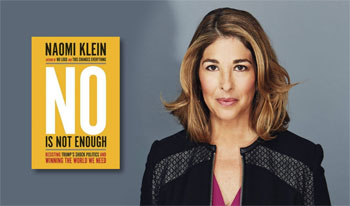
Wednesday, September 6th: Reading Through It: No Is Not Enough
The book club that’s jointly produced by Seattle Weekly and the Seattle Review of Books turns its attention to Naomi Klein’s latest book, which is based on the idea that Democrats need to do more than just offer a negative. Arundhati Roy calls it “An ordinary person’s guide to hope.” Who couldn’t use more hope? Join us for this free discussion. Third Place Books Seward Park, 5041 Wilson Ave S, 474-2200, http://thirdplacebooks.com. Free. All ages. 7 p.m.
Thursday, September 7th: A Place to Call Home
Three Seattle-area friends who are first-generation Americans — Michelle Peñaloza, Jane Wong, and Tessa Hulls — come together to share new work about what it means to be a child of immigrants. Peñaloza and Wong will read new poems, and Hulls will offer a mixed-media presentation based on a recent trip to Hong Kong. Wing Luke Museum, 719 S. King St., 623-5124, http//wingluke.org. Free. All ages. 6:30 p.m.Friday September 8th: *Word Works: Kelly Link
Kelly Link is one of the most influential short story writers in the modern era. As both a writer and as an independent publisher, Link has established an aesthetic that manages to reimagine both literary fiction and fantasy. Tonight, she’ll give a craft talk titled “A Vampire is a Flexible Metaphor.” Frye Art Museum, 704 Terry Ave., 322-7030, http://hugohouse.org. $15. All ages. 7 p.m.Saturday, September 9th: Readerfest
See our Event of the Week column for more details. Magnuson Park, 6344 N.E. 74th St. http://readerfest.com. Free. All ages. 11 a.m.Sunday, September 10th: The Pout-Pout Fish Reading
Dan Hanna is an animator who has moved into the lucrative world of children’s book authorship. His Pout-Pout Fish series of books are New York Times Bestsellers that teach kids about community and confidence, as well as how to stand up to bullies. This event will include a drawing component for kids. Third Place Books Lake Forest Park, 17171 Bothell Way NE, 366-3333, http://thirdplacebooks.com. Free. All ages. 4 p.m.Monday September 11th: Horsemen of the Trumpocalypse Reading
John Nichols is a pundit for all the media outlets that matter and The Nation’s political correspondent. His latest book is subtitled “A Field Guide to the Most Dangerous People in America.” It helps you identify prominent players in the Trump administration and explains why they suck as much as they do. The Summit, 420 E. Pike St., 652-4255, http://townhallseattle.org. $5. All Ages. 7:30 p.m.Tuesday September 12th: Poetry Northwest Reading
The oldest major local poetry publication celebrates “a year of poetry” with excellent local contributors including Alan Chong Lau, Jessica Johnson, Quenton Baker, and Christine Robbins. For most of our lifetimes, Poetry Northwest has defined the Northwest poetry aesthetic; this reading indicates they’re still doing just that. Phinney Books, 7405 Greenwood Ave. N., 297-2665, http://phinneybooks.com. Free. All ages. 7 p.m.Literary Event of the Week: Readerfest

Karen Junker is well-connected in the literary community: talk to her for five minutes and you’ll realize that she knows hundreds upon hundreds of agents and editors and publishers and booksellers. She’s an author and an event coordinator and an editor and an unpaid publicist — someone who “likes to introduce people that will help other people.”
Junker says one of her favorite things to do is to organize events that place a famous writer next to a lesser-known writer, creating the possibility to inexorably alter the course of a career. She’s organized conventions and a popular series of writing retreats called Writers Weekend and all sorts of other literary events.
And now she’s expanding her scope event further with Readerfest, a free family-friendly book festival at Magnuson Park on Saturday, September 9th. Junker just started planning the festival at the beginning of the summer, but she’s filed with Washington’s Secretary of State for nonprofit status and the whole thing came together with meteoric speed. In a phone interview just after planning began in July, Junker told me she was “adding [authors] and sponsors every day.”
“I’m a big fan of the writing community, especially in our region,” Junker told me. “I started Readerfest because the Northwest Bookfest was so cool, and I feel that this is something I can do to organize a little tiny thing to build that back up again.” She admitted to being “scared” by how quickly Readerfest grew after announcing it, but she told me that the secret to putting on a good event is that “you get good people who you know can talk about what they do.” If that happens, “I don’t have to manage that. It takes care of itself.”
Inclusivity is important to Junker. Readerfest will feature an indigenous arts tent, and there will be talks by local native artists. There will be spaces for kids and food trucks and theatrical performances. The festival will feature conversations about “cultural appropriation in literature, and race and gender representation in steampunk.” Headliners include local novelist (and Seattle Review of Books columnist) Nisi Shawl; author of the Seattle-set Clockwork Century series Cherie Priest; former Seattle Youth Poet Laureate Angel Gardner; and novelist Kathleen Alcala.
Readerfest doesn’t look to be as polished as Bookfest used to be, but that’s not necessarily a problem: Junker’s aesthetic is to get a whole bunch of people into one space and find out what happens. That concept — a space where aspiring authors can mingle with editors and agents and playwrights and authors from different genres can compare notes — is more appropriate for Seattle’s literary scene than the giant commercial corporate monolith that Bookfest became at the end of its short life.
In the end, Junker told me, she wants to put on an event that will connect people to books that they’ll love. “I just felt the need in the community for this kind of event — one that’s family-friendly but not exclusive of any genre. I’m a fan of all types of writing, and there’s a reader for everything,” she says.
Seattle Mystery Bookshop to "most likely" close at the end of September
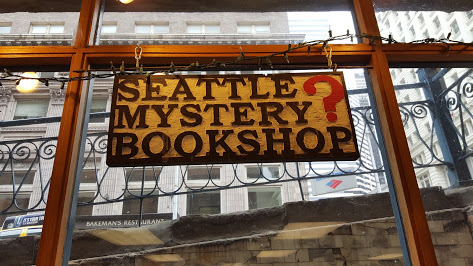
On the first day of August, I reported that Pioneer Square mystery bookstore Seattle Mystery Bookshop was for sale. Last night, a number of Seattle-area book journalists received an email from Seattle Mystery Bookshop owner J.B. Dickey. "We've received no firm offers for the shop," Dickey says, "so it feels as if it is time to start winding things down."
"Most likely the end of the month will be it," Dickey explains. He wants everyone to know that the store is now hosting a big sale: 50 percent off all used books and 30 percent off all new books published before 2017. The bookshop is open from 10 am to 5 pm Monday through Saturday.
If no last-minute buyer comes through, hopefully some other Seattle-area bookstores will hire Seattle Mystery booksellers Fran and Amber, both of whom have years of bookselling experience and are voracious readers.
If you'd like to read more about Seattle Mystery Bookshop, we featured them in our Bookstore of the Month feature a couple years ago:
- Our September Bookstore of the Month is Seattle Mystery Bookshop
- The recommendation engine
- The staff of Seattle Mystery Bookshop recommends mysteries for people who think they hate mysteries
Stop by the bookshop in the next few days. If you haven't visited in a while, your presence will be much appreciated. If you've never visited before, you'll want to spend some time in an underappreciated Seattle literary treasure before it goes away forever.
...and while we're talking about Amazon and Whole Foods...
...a few thoughts that weren't necessarily pertinent to today's Lunch Date column that I still wanted to collect:
It's now clear that Amazon Books, the brick-and-mortar bookstore Amazon built in University Village, was the trial run for Amazon buying some national retailer like Whole Foods. They wanted to get a handle on signage and displays and all the other practical elements of physical retailing before buying into a real-world sales environment.
The signage in Whole Foods now definitely resembles the signage at Amazon Books. It's not as enthusiastic as the signage you'll find in other grocery stores, and that makes it interesting. It may only be a matter of time before we see signs over displays of turnips referring to customer data, the way Amazon Books proudly displays bestseller ranks on their marketing materials.
Like the Amazon site, there are sales that follow you around the store at Whole Foods. Last weekend, for instance, all Kleen Kanteen water bottles were 50 percent off. As you walked around the store, you'd encounter signs for Kleen Kanteen displays, directing you to different places. Clearly, the Kleen Kanteen deal was a loss-leader — something ridiculously attractive to draw you inside the space and keep you hunting around. Amazon is most definitely applying their online sales philosophy to the physical spaces. And I bet it works really well.
We're very likely to see some widescale experimentation in the grocery space, and I bet every other grocery chain is sending employees into nearby Whole Foods to keep an eye on them. Expect to see every chain — not just the high-end grocery stores — start to emulate Whole Foods.
I think the next thing we'll see from the big chain stores is an attempt to shake off their unionized employees, claiming that the cost of competing with Amazon is too high to pay union wages. (Amazon was probably interested in Whole Foods in part because they're not unionized.) If unions know what's good for them, they'll argue that it's their expertise and customer service that's keeping non-Amazon grocery stores afloat. Amazon isn't interested in the Whole Foods workforce; they've demonstrated in the way they treat warehouse pickers that they believe ground-level employees are disposable chattel. Grocery stores should respond to the threat of Whole Food by paying their employees more, not less, and making sure their employees are better at their jobs than Whole Foods employees.
I would advise other grocery stores to keep the bookstore model in mind. The bookstores that are still around after Amazon are around because they're very good at what they do: they're attractive and interesting places to visit, and they provide experiences that Amazon can never duplicate. Put it this way: Amazon isn't going to put PCC and other quality region-specific retailers out of business, the same way Amazon couldn't put Elliott Bay Book Company out of business. But Safeway and QFC and other large chains, if they try to out-cheap Amazon by cutting corners on labor and variety, are very likely to go the way of Borders and Books-a-Million.
Do not doubt that this is war. Amazon doesn't get into a space unless they plan to dominate that space. Sometimes they make mistakes. (See the Fire Phone for the best example of an Amazon failure.) Most times, they don't.
The end of the world, again
Published September 05, 2017, at 12:22pm
Every dystopian novel has a gimmick. What Seattle author Jennie Melamed's debut novel does right is it uses dystopia to stand in for the cycle of abuse.
Lunch Date: Taking a Naomi Klein Book to the new veggie burger bar at Amazon Whole Foods
(Once in a while, I take a new book with me to lunch and give it a half an hour or so to grab my attention. Lunch Date is my judgment on that speed-dating experience.)
Who’s your date today? No Is Not Enough: Resisting Trump's Shock Politics and Winning the World We Need by Naomi Klein. (We're going to be discussing this book at our Reading Through It Book Club tomorrow night at Third Place Books Seward Park. You should join us at 7! It's free, and no purchase is necessary to talk about the book. Alcoholic drinks are available.)
Where’d you go? I went to Next Level Burger, the new veggie-only burger bar at the Whole Foods on Roosevelt.
What’d you eat? I had the "sausage" (tempeh) bacon burger, the tater tots, and a peanut butter shake made with coconut milk. Here are some pictures:

How was the food? I want to be clear: I am a carnivore, but I love fake meat. I will often choose fake meat over real meat, when given an option. I love vegetarian restaurants. That said, everything about this burger was pretty damn dry. I want a burger — veggie or no — to have some juice to it, or at the very least a little sauce. The only part of this burger that was not dry was the fake cheddar cheese, but there wasn't enough of that to make up for the mouthfuls of dry fiber I was biting into. If you're interested in Next Level, I'd suggest getting a saucier burger to start — maybe the BBQ Bleu or something like that. The tater tots were great; I found them to be perfectly crispy and very tater-totty. The shake had a good, drinkable consistency — I hate a too-thick shake — but the coconut milk wasn't the best blend with the peanut butter. I'd suggest getting the soy milk if you're choosing a peanut butter shake. Altogether, I liked Next Level better than, say, Veggie Grill, but if you're looking for non-meat options, you should stick with Seattle's many independent vegan or vegetarian restaurants, because the chains still don't have the formula down yet.
What does your date say about itself?
Donald Trump's takeover of the White House is a dangerous escalation in a world of cascading crises. His reckless agenda--including a corporate coup in government, aggressive scapegoating and warmongering, and sweeping aside climate science to set off a fossil fuel frenzy--will generate waves of disasters and shocks to the economy, national security, and the environment. Acclaimed journalist, activist, and bestselling author Naomi Klein has spent two decades studying political shocks, climate change, and "brand bullies." From this unique perspective, she argues that Trump is not an aberration but a logical extension of the worst, most dangerous trends of the past half-century--the very conditions that have unleashed a rising tide of white nationalism the world over. It is not enough, she tells us, to merely resist, to say "no." Our historical moment demands more: a credible and inspiring "yes," a roadmap to reclaiming the populist ground from those who would divide us--one that sets a bold course for winning the fair and caring world we want and need. This timely, urgent book from one of our most influential thinkers offers a bracing positive shock of its own, helping us understand just how we got here, and how we can, collectively, come together and heal.
Is there a representative quote?
The trouble is, to understand Trump you really have to understand the world that made him what he is, and that, to a very large extent, is the world of branding. He reflects all the worst trends I wrote about in No Logo, from shrugging off responsibility for the workers who make your products via a web of often abusive contractors to the insatiable colonial need to mark every available space with your name.
Will you two end up in bed together? Obviously, yeah, since we're talking about it at the book club tomorrow. (Join us! Bring your friends!) But I sure did feel weird reading about brands in the middle of one of the biggest brand takeovers in recent memory: Amazon's swallowing of Whole Foods. The next time I read Naomi Klein in public, it's going to be at a nice, locally owned spot that better reflects the values of her books.
Uncle Ben: What the Number Said
I’m five years old.
We’ve just been buzzed into Aunt Miriam’s house.
Uncle Ben’s office is to the right, off the hall.
Before walking upstairs to the second floor,
I look to the right and see dark.
Mother holds my hand while I peak in:
Equipment. The kind the Nazis used?
No, for taking x-rays.Overheard: Once, he gave me medicine
to abort my baby but it didn’t work
and the baby was born with an extra thumb.I’m thirteen years old now.
Uncle Ben’s been dead eight years.
Daddy says the only good German is a dead German.
That was 1946 and Uncle Ben can’t practice medicine
at Johns Hopkins hospital. No Jews allowed.
Is that why he doesn’t smile?I don’t know how to like him.
He doesn’t look at me.
He has a Doberman Pinscher named Prince.
When women come to the house,
Prince looks under their dresses.
Men laugh. Women are embarrassed.In the basement of Aunt Miriam’s house,
a ping pong table and knotty pine walls.
Once when I was nine
a cousin played ping pong with me.
He was sixteen. Now I’m sixteen
and I read about a man the Nazis put in a freezer.
to see how much cold a human being can withstand.
When the man’s testicles turned blue, he collapsed
and guards dragged him out. A doctor records
how much time it took for the man to die,
but I don’t remember what the number said.
Save the date for SAL's Sherman Alexie Loves, Women You Need to Know, and a stellar poetry lineup
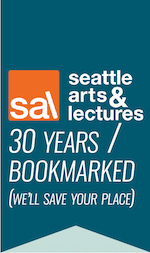
Sponsor Seattle Arts & Lectures stopped by just a few weeks ago to promote their 2017/2018 season, a 30th anniversary celebration packed with speakers you'll want to see. Now they're back to highlight three deftly curated special series: Sherman Alexie Loves, Women You Need to Know, and SAL's Poetry Series, which is one of the best Seattle has to offer.
We're excited to see such impressive lineups, and especially that SAL has brought so many voices into the selection process — the Poetry Series was chosen with advice from new Civic Poet Anastacia-Reneé, Billie Swift of Open Books, and Claudia Castro Luna, among others. Women You Need to Know continues to shine in its third year, with Janet Mock, Ijeoma Oluo, and Ariel Levy. And we couldn't be more thrilled to see Sherman Alexie back on stage. Check out the full lineup, get tickets while you can, and settle in for an amazing season.
Sponsors like Seattle Arts & Lectures make the Seattle Review of Books possible. Did you know you could sponsor us, as well? Get your stories, or novel, or event in front of our passionate audience. Take a glance at our sponsorship information page for dates and details.
A Labor Day proposal: Let's create more blue-collar novelists
It's a well-known fact that America moved its celebration of labor from May 1st, when the rest of the world observes it, to September. The reason why is clear: government leaders were concerned that celebrating labor on May Day would encourage socialism. Because of that shift in date, Labor Day is celebrated as the early end of summer in the US. Americans barely acknowledge workers at all over Labor Day weekend — especially if we’re lucky enough to get the weekend off. (Shout-out to all you booksellers working today. We see you.)
So I wanted to take the day to talk a little bit about labor. Specifically, the labor of writing. Here in the US, we still have an archaic understanding of what “work” is. Creative pursuits like art and writing are often considered hobbies — even if the writer is a professional who makes a living from the writing. Almost every novelist has a story or fifteen about someone at a party who follows up the “what do you do” question with an especially patronizing comment like “so you just sit around and stare out the window all day?”
Writing is labor. Being a novelist is labor. It is work. More, it is vital work. But there are very few “blue-collar” novelists out there, and I believe that is a problem. The publishing industry rewards a few novelists with large paychecks, while the rest — the novelists who used to be referred to as “midlist” — have to teach full-time or find some other way to supplement their income. As a result, bookstore fiction sections are overstuffed with novels about trust fund kids who live in Brooklyn or college professors or independently wealthy people. I believe more people would read novels if the novels resembled their daily lives in some way.
For years, I’ve had a theory. The math here is way too simplistic, but bear with me as I fumble through. I’m offering a thought experiment, not an accounting ledger. Let’s say there’s a sci-fi publisher, and they have a roster of three or four incredibly popular novelists who have signed six or seven-figure book deals. I would like to see a publisher take the money they would traditionally put toward one superstar bestselling writer and instead split it up and dedicate it to a fleet of 20 or so blue-collar sci-fi novelists at salaries of, say, $50,000 per year, plus benefits.
These salaries would mean the publisher gets first pass at everything these salaried writers compose. (If they decline, the author would be welcome to shop it around.) There would be profit participation, so if a novel or a series took off, the author would enjoy some of that success. Rather than spending their valuable time scrambling around as freelancers, those writers could take the security of a weekly paycheck and devote it to writing. I’d be willing to bet they would produce more work, and they would be happier, than writers who have to continually hustle their own work.
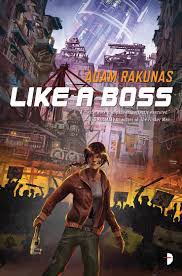
I think this investment would pay off for the publishers. Out of those twenty writers, it’s highly likely that at least one would enjoy modest success that would cover a significant sum of the salaries. And the other writers would enjoy the opportunity to hone their craft and build a body of work that could, eventually, pay for itself in the years ahead.
I don’t want to deny the truth that blue-collar fiction exists out there. Adam Rakunas’s Windswept series is about a labor organizer in space, for crying out loud. But I do think that if publishers encouraged more writers to live a secure middle-class life, they would publish more fiction that appealed to more Americans. If we don’t get better about honoring workers — all workers, even the ones in creative fields — with the security to live their lives, Labor Day will truly be meaningless.
The Sunday Post for September 3, 2017
Each week, the Sunday Post highlights a few articles good for slow consumption over a cup of coffee (or tea, if that's your pleasure). Settle in for a while; we saved you a seat. You can also look through the archives.
Nightingale: A Gloss
Paisley Rekdal's beautiful, devastating comment on her poem "Philomela" deserves a willing commitment of time and attention. Fair warning: it's anchored by an open recounting of sexual assault, so read at your own emotional risk. Rekdal draws on centuries of poetry — Shakespeare, Ovid, Chaucer are just a start — to gloss her experience and her own lines, spiraling away from and back to the narrative. This is literature at the top of its game.
Perhaps the greatest desire a victim of violence has is to look, in memory, at that violence dispassionately. But remembering, the heart pounds, the body floods with adrenaline, ready to tear off into flight. For some, there is no smoothing chaos back into memory. Poetry, with its suggestion that time can be ordered through language, strains to constrain suffering. It suggests, but rarely achieves, the redress we desire. Language does not heal terror, and if it brings us closer to imagining the sufferer’s experience, this too does not necessarily make us feel greater compassion, but a desire for further sensation. If we cannot articulate pain beyond inspiring in the listener a need for revenge, we only speak of and to the body.
The Secret e-Book That Changed My Life
An impassioned piece by Scott Esposito, author of The Surrender, on why books matter — with a visceral example from his own life. As Esposito says, it’s easy for even the most dedicated readers, writers, and booksellers to feel overwhelmed by the daily grind and the “mind-numbing cascade of new books, book reviews, author interviews, profiles, lists, gossip, feuds, and so on.” His essay is a welcome antidote.
I know that against the awesome power of the President of the United States a single book doesn’t seem like much, against a hateful Klan rally a mere LGBTQ bookstore display seems puny. But I’m here to tell you that these things do make a difference for a lot of people. We must not doubt the importance of books. When we publish, or handsell, or review, or simply recommend to a friend, we must think very deeply about the kinds of messages we are putting into the world, as well as the sort of country we want our literary culture to represent. They are heard and seen by people all around us, and they are affecting lives.
The Rise of the Valkyries
Lana Lokteff runs a media company that’s the digital hub for the alt-right, and advocates for using the fear of rape as a conversion tactic to bring other women into the fold. Ayla Stewart is a successful YouTube personality who dresses her children (her “BASKET FULL OF ADORABLES”) as Pepe the Frog. Mary Grey is a podcaster and the author of the children’s book Walls and Fences (“Why do we build walls? We have walls for protection.”).
These are women walking a very thin line, stepping into positions of power within our nation’s ugliest political splinter group while advocating for their own subordination. Seyward Darby’s investigation of how the alt-right’s perhaps most dangerous members operate, and what they hope for, is a long, slow punch in the stomach.
For months, America has tried to understand what the movement wants. Perhaps the better question is, who gets to decide? In grappling with how to set priorities, the alt-right is bumping up against ideological contradictions, divergent opinions, and other schisms in its ardent, loosely formed ranks. Assertive women are exposing some of these fissures, which seem likely to grow as the movement vies for a modicum of political acceptance.
Lokteff, though, is sanguine. “Ten years from now, a lot of these alt-right concepts are going to be very mainstream in white people’s minds,” she told me. Then, as though a light bulb had clicked on in her brain, she continued: “Look at feminism. It started as a fringe movement. Now it’s mainstream, left and right.”
My week in Lucky House: the horror of Hong Kong's coffin homes
Benjamin Haas spent a week in Hong Kong’s ironically named Lucky House, where “the poorest people in the most expensive city in the world” find shelter in tiny plywood enclosures, so small they’re openly referred to as “coffin homes.” Haas got just a taste of life in twelve feet of personal space; as you read his essay, imagine the experience without an exit date. This photoessay on the same subject from June has blunter impact; the two pair well.
The plight of Hong Kong’s coffin dwellers is well known throughout the city. The tight living conditions have become so infamous, one hostel styled its dormitory as a sort of hip hybrid of coffin homes with modern details.
The hostel bills itself as “authentically HK”, which strikes me as insensitive, as no one who has spent a night in a coffin home would ever think there is anything trendy about how the poorest live.
But the hostel’s existence speaks to the complacency that has developed, with many Hong Kong residents convinced the city’s problems are unsolvable.
Seattle Writing Prompts: The Fremont Bridge
Seattle Writing Prompts are intended to spark ideas for your writing, based on locations and stories of Seattle. Write something inspired by a prompt? Send it to us! We're looking to publish writing sparked by prompts.
Also, how are we doing? Are writing prompts useful to you? Could we be doing better? Reach out if you have ideas or feedback. We'd love to hear.

It was the first one, you know. Out of the six bascule bridges in Seattle, five of which are on the same waterway (starting from the east: Montlake Bridge, University Bridge, Fremont Bridge, Ballard Bridge, and the Salmon Bay Bridge, which is the train bridge with the huge counterweight hovering over it, and which is open unless a train goes to cross, so opposite the others in that way), the last being the First Avenue South Bridge over the Duwamish.
But Fremont was first, and this year we celebrate its centennial. It opened on June 15, 1917. It's the busiest drawbridge in the United States, apparently (although, Wikipedia says citation needed on that fact so if you have facts, consider editing). It was the home of writer-in-residence Elissa Washuta for three months, while she explored the history of the Lake Washington Ship Canal, and how its construction changed the landscape and displaced indigenous peoples.
There used to be a sign on the southern entrance to the bridge that said "Now entering Fremont, center of the universe, throw your watch away", but it's gone now. When we drive across the bridge, the sound of the grating buzzes under our wheels. If we stop, which thanks to Seattle traffic is not uncommon, you can see the water through that steel.
It raises faster than you think it should, the bridge operators, those anonymous heroes or villains (depending on if the red light flicked on before you started crossing or after) are obsessed with safety, as they should be. Bridge operator (and writer) Barb Abelhauser took the Stranger to task for cheering on a cyclist who climbed the open Ballard Bridge.
I have a friend who claims, that in High School in the eighties, he would get drunk with a buddy and sit with their backs on the straight posts of the University Bridge and ride it as it opened and closed, hanging on for dear life. We strongly recommend against such stupidity, but it goes to show that the idea of crossing that illicit boundary of the lowered barrier is not an uncommon one. Why, just look at the fantasy fulfillment of the Blues Brothers movie.
It is a busy bridge — an average of 3,108 cyclists each day ride across. In 2006, the Fremont Bridge had opened over 566,000 times, about 35 a day on average. It was designated a historic landmark in 1981.
Everybody has a favorite bridge. Montlake is cute as a button, and feels almost gothic. University has a kind of laid-back stretch, like a giant who just woke to yawn. Ballard feels like a commercial fishing vessel, functional, built for purpose more than style. But the Fremont bridge has a certain romance to it. The Fremont Bridge, if it were a person, feels like the one that would have attended all the cool punk shows, smoking clove cigarettes. It has the most sparkle of the set, like it has lived a life we can barely understand. It's the artsty-fartsy one, with the neon repunzel hanging out a window.
But isn't that silly to romanticize it? The bridge is, simply, a functional and important part of transportation infrastructure. But oh my goodness do all those people crossing it give us ideas for stories.
Today's prompts
The bridgetender couldn't discriminate. When a boat needed to go through, she could hold them up while she made sure another wasn't coming along soon, but at some point she was going to raise the bridge to let them through. Until, she was surprised to see, the distinctive lines of her father's 45-foot sloop. Her father, who had left five years ago without saying anything. Who had taken all the money and disappeared. Who had a warrant out for his arrest.
Most cannot see the veil that hangs down the center of the ship canal. But surely you've noticed how much you prefer one side to the other? There are those that only cross into Fremont or Ballard if they must, and there are those that don't feel safe until they do. But Miranda, who had the sight, could see the veil, and she knew what it protected. And she could see the rip that was forming every time the bridge lifted and fell.
Mother mouse was a worrier, and baby boy mouse was a daredevil. But with twelve children to manage, she didn't have time to fret too hard over one. But on this day, when she needed to make sure all safely crossed the Fremont bridge, she fretted extra hard. She grouped them, surrounding baby boy with his more obedient older siblings. They had just crossed the gap that connected the two leaves of the bridge, when baby boy jumped back across and scurried up a post "I want to see the boat better!" he called. Mother mouse shrieked when she heard the horn. She knew the bridge was about to rise, and she had to get everybody off before it happened.
The job of the grosstender was to cut down the bodies, the ones hung to show the power of the bridge guard. The grosstender was sub-human to most, which was good because he was left alone. Each body he hauled by wheelbarrow to the burial site reminded him of someone from before, when the bridge was not a medieval pseudo-military asset, but simply a way to cross the water, and back then, you didn't have to pay to do it, or die if you tried to cross without payment. So he gave them names, and when he buried them, he wrote that name in the dirt atop their grave. That worked fine until the day that the grosstender came across someone he actually remembered from before.
She figured that femme-y rider was totally straight. Wedding ring, a kind of norm straight-girl vibe to her. Maybe two or three times a month, they'd converge on the bridge during their commutes, Chantel coming from Frelard, the norm girl from Wallingford. They'd taken to saying hi to each other, and sometimes riding together for a bit down the Westlake cycle track in silence, but a silence that made Chantel's heart beat fast. One day, Chantel was surprised to see her sitting on the bridge approach, holding her ankle. Chantel stopped, and saw blood. "I have a first aid kit," the girl said. "In the left-hand Ortlieb, can you please get it?" Chantel unrolled the panier, and looked inside as the girl said "No! In the left hand one!" but it was too late. Chantel had seen what she was hiding, and it made her bite her lip with excitement.

